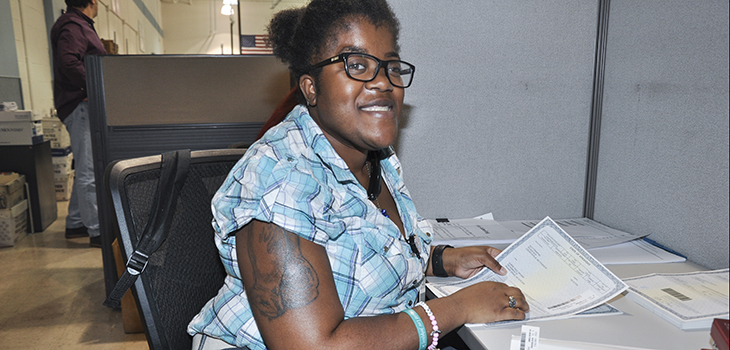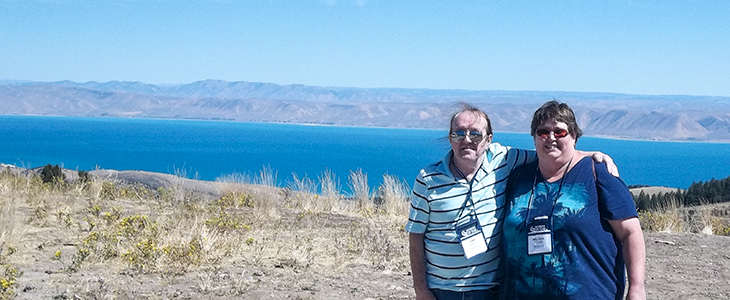Reprinted from 2017 Holiday Advocate Newsletter
Since her start as executive director in July, Kathleen Durkin has been on the move, talking and meeting with people we support, families and staff. Families, in particular, have questions about the new Federal Medicaid rules and the State’s Employment First Initiative, the changes The Arc is making to comply, and what some of the new terminology really means. The Q&A below, gleaned from recent Meet & Greets Kathleen hosted for families, offers definitions as well as examples to shed light on what’s happening.
- PERSON-CENTERED PRACTICES
Do Person-Centered Practices mean there’s a change in the Individual Plan [IP] process? And what is the difference between my case manager at The Arc and the “resource coordinator” from Service Coordination, Inc.?
KATHLEEN: Person-Centered Practices are the core of our services, and so yes, the IP process and document continue to evolve. Regulations dictate that a “targeted case manager” or “coordinator of community service (CCS)”, who is employed by an outside agency (such as Service Coordination for many in our region) play the lead in scheduling, facilitating, and documenting the IP, not The Arc staff.
The new IP document, developed by the State, will roll out in the next year, and you will notice several changes. I particularly like the approach that guides discussion on options that are “important for” and “important to” the individuals we serve. This approach distinguishes between things a person needs (“important for”) for health or safety, such as medication or adaptive equipment, and things a person values or desires (“important to”), such as relationships, living with friends with similar interests or near his/her place of worship, or working in a quiet employment setting.
The challenge for the team is to balance those details to support the person’s life goals
Historically, the team’s inclination has been to consider the “important for” as priority, and sometimes, the “important to” can get overlooked. If we are honest with ourselves, the quality of our lives is measured by the “important to” without neglecting the health/safety concerns.
A Person-Centered Practices Example
Carl Reeder often talked about how much he wanted to go on a cross-country train trip someday. When Carl’s direct support staff, Melissa Myers, overheard him talking about his dream trip, she immediately knew she wanted to make it come true. To get started, the team figured out a savings plan so Carl could pay for the trip. Over the next year, they worked with a travel agent specializing in train excursions. Their two-anda-half-week itinerary took them across much of the U.S. heartland and several western states. Highlights included Mount Rushmore and the Crazy Horse Memorial, Yellowstone and Badlands National Parks, and a chuck wagon supper and show. They traveled with a tour group and made many friends. He and Melissa still are in contact with some of them. Although the trip was long and exhausting, they agree it was an experience they will not forget. Carl even wrote about it for our agency blog and posted pictures along the way on his Facebook page for friends to follow along. It seems Carl was infected by the travel bug because he and Melissa are planning and saving to visit Hawaii next.

- SETTINGS
My sister has attended the day center for many years, and I heard that the new regulations are going to require that she leave the center. She likes her center and we both feel she is safe there. Can she just stay? If not all the time, how much is she supposed to spend elsewhere, and what will she be doing? Is there enough staff? I am worried.
KATHLEEN: Nowhere in state or federal requirements does it say a person cannot be in the day center. Instead, the focus is on introducing more opportunities to access and engage with the community outside of those four walls at jobs, whether paid or vounteer, and activities of interest to the person.
The question of how much time outside the center is enough can only be answered by the individual (your sister) and her team (you and others) after thoughtful discussion. The question “What do you want to do today?” is not enough. Choice is based on experiences and knowledge. Choosing between chocolate and vanilla when I didn’t know there was strawberry isn’t a real choice.
You will see your sister offered many more options so that she and the people who know and care about her can continue to learn about her in new ways, while the support staff also address any safety concerns you may have.
The State acknowledges that staffing will be a challenge. In some centers, staffing ratios can be as high as 8:1 or 10:1, which are not conducive to community integration. We will continue to advocate for better rates and staffing as we move forward with creative approaches to community engagement. Your advocacy both at the team meeting and with the Developmental Disabilities Administration is always encouraged.
We need your ideas and connections to help us in any way you can. If you have contacts in your local areas that you think could be options for potential job leads, volunteer experiences or meaningful activities, please contact our Assistant Executive Director of Employment and Day Services Erin Lindholm at elindholm@thearcbaltimore.org or 410-296-2272 x 5521.
A Settings Example
For some time, Tonya Barnes prepped and served food at our Homeland Center, but staff knew she was capable of more. With guidance from our Business Services Department, she interviewed with Martin’s West, the catering and event venue in Woodlawn. She got the job! We make a concerted effort to help those who work at our day centers find meaningful employment in their own community. Since Tonya lives in Woodlawn, she no longer has a 30+ minute commute. She loves her job and Martin’s loves her work ethic.
- EMPLOYMENT FIRST
My brother is 45 and has never worked. What makes you think you will be able to get him a job now? How are you going to get enough jobs for everyone? What if someone does not want to work or they are just not able to because of their disability? What are their options? I will be graduating in a couple of years and thought I would be able to go to a center. What can I do to improve my chances of getting a job?
KATHLEEN: The State’s Employment First focus does not mean employment is the only option. But, it is the first, and preferred, option explored with someone. It also means that we will have that discussion frequently throughout the year with every person. If someone wants to work, our team will help them find a good job match.
“Discovery” is a word you will hear often in the employment process. It is the first step in finding out who someone is, what they want to do and what they have to offer. It is based on someone’s interests, skills, environmental preferences, goals, and other topics. It is strength-based rather than outlining someone’s deficits – which of course doesn’t land someone a job! The importance is that the discovery model is personcentered.
Communication between all members of an individual’s team will be key to learning all we can about their interests and talents that may lead to a job.
“Customization” is another term you may hear in the employment process for some. After the discovery process, customization matches the person’s discrete skills to an employer who has an immediate need for those skills and contributions. The process opens up possibilities rather than just trying to “fit” someone into a fixed job description. In short, the job match is key to success for both the person and the employer.
We understand that work may or may not be full time. A 30- or 40-hour work week is not for everyone. A job of even two- to-five hours a week may be fulfilling for some. Sometimes individuals tell us they prefer not to work or want to retire. Many mix work and community activities. Our job is to find the right match, and we will need your ideas, connections, and suggestions.
Much is changing as well for the young people exiting the school system. We are excited to work with school systems earlier than previously to introduce the idea of work to upcoming transitioning youth. We also have several new programs for young adults through the Division of Rehabilitation Services’ (DORS) Pre-employment Transition Services; the focus is on exploring the expectations of finding and keeping a job.
An Employment First Example
Francine Jones participated in our Project SEARCH at MedStar Union Memorial Hospital and the Career Catalyst intern-to-work programs after high school graduation. Francine’s participation showed that employment is possible for her. She earned several internships and jobs that provided necessary training, but she felt they weren’t the right fit.
Instead, she decided to look for a clerical position, which meant expanding her skills and “office work” prospects. To do that, Francine entered an internship with PDP Group, a company that provides tailored insurance plans. When it was completed, she was hired for 20 hours a week and is happy working hard on the PDP team. She also likes earning a paycheck!



